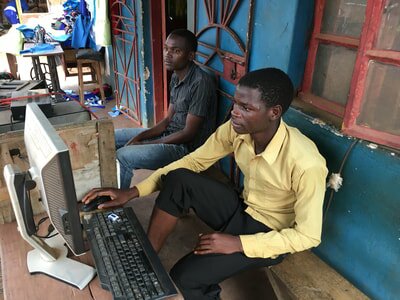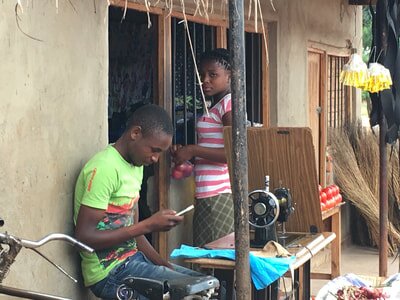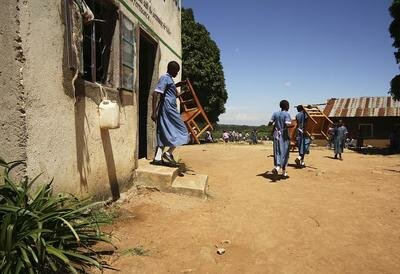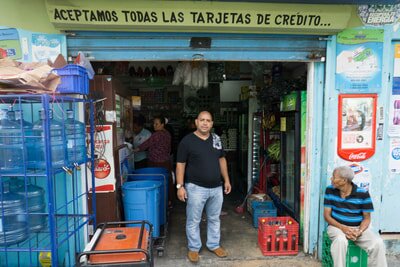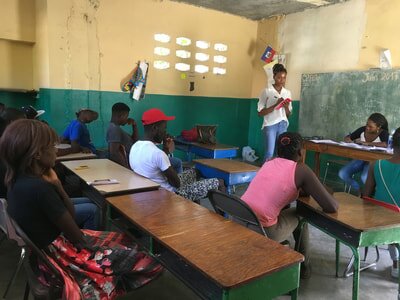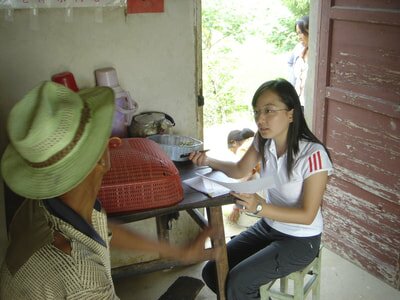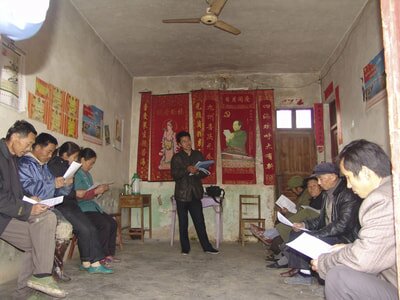In 2017, the DCO awarded 13 grants to studies addressing one or more of the following research questions:
#1 What are the short-and long-run impacts (both positive and negative) of digital credit on consumers in emerging markets?
#2 Is there heterogeneity in impacts along borrower characteristics (i.e. financial literacy, time preferences, income, and/or gender)?
#3 How can non-traditional credit-scoring algorithms, regulations, and other consumer protection measures be designed to minimize default, over-indebtedness, leakage, fraud and other risks to consumers?
#2 Is there heterogeneity in impacts along borrower characteristics (i.e. financial literacy, time preferences, income, and/or gender)?
#3 How can non-traditional credit-scoring algorithms, regulations, and other consumer protection measures be designed to minimize default, over-indebtedness, leakage, fraud and other risks to consumers?
Full-Scale Studies by DCO Scientific Directors
Building Better Credit Scoring Algorithms
Lead Researcher: Joshua Blumenstock (DCO Scientific Director, UC Berkeley)
Research Team: Daniel Bjorkegren
Country: Kenya
Partner: Branch and Busara
To address the lack of financing for promising economic activities in developing countries, this study leverages the existence of alternative information -- call detail records and other “digital trace” data from phones -- to develop new algorithms for constructing credit scores. Primary focuses are two-fold. For digital credit scores that account for predicted welfare improvements to the borrower, this study will identify signals in the data that are indicative of the welfare of the user (for instance, whether they are late with their utility bill payments), and determine whether the receipt of a digital credit loan leads to improvements in this measure of welfare via machine learning. For designing algorithms that are "manipulation-proof" and transparent to borrowers, this study will develop theoretical models for the new algorithm, and calibrate and test this algorithm through a “lab in the field” behavioral experiment in Nairobi. The findings will contribute to the development of novel credit scoring mechanisms that help improve consumer welfare and transparency. Results forthcoming.
Lead Researcher: Joshua Blumenstock (DCO Scientific Director, UC Berkeley)
Research Team: Daniel Bjorkegren
Country: Kenya
Partner: Branch and Busara
To address the lack of financing for promising economic activities in developing countries, this study leverages the existence of alternative information -- call detail records and other “digital trace” data from phones -- to develop new algorithms for constructing credit scores. Primary focuses are two-fold. For digital credit scores that account for predicted welfare improvements to the borrower, this study will identify signals in the data that are indicative of the welfare of the user (for instance, whether they are late with their utility bill payments), and determine whether the receipt of a digital credit loan leads to improvements in this measure of welfare via machine learning. For designing algorithms that are "manipulation-proof" and transparent to borrowers, this study will develop theoretical models for the new algorithm, and calibrate and test this algorithm through a “lab in the field” behavioral experiment in Nairobi. The findings will contribute to the development of novel credit scoring mechanisms that help improve consumer welfare and transparency. Results forthcoming.
Estimating the Effect of Digital Credit: An Experiment with Airtel Malawi
Lead Researcher: Jon Robinson (DCO Scientific Director, UC Santa Cruz)
Research Team: Pascaline Dupas, Valentina Brailovskaya, and Eilin Francis
Country: Malawi
Partner: Airtel Malawi and IPA
Digital credit may have promising features that can further contribute to financial inclusion. However, there is a lack of rigorous evidence on digital credit. This study aims to understand 1) the impacts of Airtel Malawi’s digital credit product Kutchova on borrowers, 2) the degree to which consumers are fully informed about these new products as well as the costs of taking out these loans, 3) the effect of having the access to mobile money savings account on demand for Kutchova loans, and 4) the characteristics of the consumers who take up Kutchova loans. This study will investigate these questions via a regression discontinuity design around the credit threshold (focusing on the effect of credit), and a randomized experiment (focusing on whether information or savings interventions reduce demand for credit). The findings will support policy makers and implementers in understanding the welfare impacts of digital credit and making critical decisions to enhance socio-economic development. Results forthcoming.
Lead Researcher: Jon Robinson (DCO Scientific Director, UC Santa Cruz)
Research Team: Pascaline Dupas, Valentina Brailovskaya, and Eilin Francis
Country: Malawi
Partner: Airtel Malawi and IPA
Digital credit may have promising features that can further contribute to financial inclusion. However, there is a lack of rigorous evidence on digital credit. This study aims to understand 1) the impacts of Airtel Malawi’s digital credit product Kutchova on borrowers, 2) the degree to which consumers are fully informed about these new products as well as the costs of taking out these loans, 3) the effect of having the access to mobile money savings account on demand for Kutchova loans, and 4) the characteristics of the consumers who take up Kutchova loans. This study will investigate these questions via a regression discontinuity design around the credit threshold (focusing on the effect of credit), and a randomized experiment (focusing on whether information or savings interventions reduce demand for credit). The findings will support policy makers and implementers in understanding the welfare impacts of digital credit and making critical decisions to enhance socio-economic development. Results forthcoming.
Full-Scale Studies
Reducing Default and Improving Resilience on Digital Credit
Lead Researcher: Tavneet Suri (MIT)
Country: Kenya
Partner: Tala and IPA
Financial resilience is important to financial wellbeing. However, in Kenya, about half of households experience unexpected negative events in a year. This study seeks to test a new lending product that would give borrowers who are close to default the opportunity to extend their loan terms, and take out additional small amounts of capital to help them deal with any shocks. The motivation is that borrowers who have an unexpected negative event happen may need some extra time and capital in the short term that they can later repay fully. This study will test that hypothesis by working closely with a digital lender, Tala, to offer extended terms to some customers who default on their loans. It would be run as a randomized control trial with two treatment groups: 1) offered an extended time to pay off their loan, and 2) offered additional capital over the extended time. It will shed light on why people default, and in the long run help build screens for those experiencing negative events to provide them with better financial management tools. The findings will contribute to the design and implementation of programs and policies that intend to reduce defaults, improve resilience and protect consumers. Results forthcoming.
Lead Researcher: Tavneet Suri (MIT)
Country: Kenya
Partner: Tala and IPA
Financial resilience is important to financial wellbeing. However, in Kenya, about half of households experience unexpected negative events in a year. This study seeks to test a new lending product that would give borrowers who are close to default the opportunity to extend their loan terms, and take out additional small amounts of capital to help them deal with any shocks. The motivation is that borrowers who have an unexpected negative event happen may need some extra time and capital in the short term that they can later repay fully. This study will test that hypothesis by working closely with a digital lender, Tala, to offer extended terms to some customers who default on their loans. It would be run as a randomized control trial with two treatment groups: 1) offered an extended time to pay off their loan, and 2) offered additional capital over the extended time. It will shed light on why people default, and in the long run help build screens for those experiencing negative events to provide them with better financial management tools. The findings will contribute to the design and implementation of programs and policies that intend to reduce defaults, improve resilience and protect consumers. Results forthcoming.
Gender-Differentiated Credit Scoring Algorithms Using Call Detail Records and Machine Learning*
Lead Researcher: Sean Higgins (UC Berkeley)
Research Team: Paul Gertler and Laura Chioda
Country: Dominican Republic
Partner: ALNAP, Claro Dominicana, and IPA
Low-income women disproportionately lack access to credit, often because they lack credit histories, property rights, and formal earnings. This study seeks to understand 1) whether gender-differentiated credit scoring models using non-traditional data (e.g. bill payment histories, call detail records and default records) can increase women’s access to formal credit, 2) whether women rejected by standard credit scoring models would benefit from credit access along the dimensions of asset ownership, labor supply, risk coping, intra-household bargaining power, and intra-partner violence, and 3) how these benefits compare to the benefits of credit access for women selected by standard models. Partnering with the largest telecommunications company and one of the largest banks in the Dominican Republic, this study combines novel algorithm development with an impact evaluation of credit allocated based on the novel algorithm. The findings will contribute to lowering barriers to financial inclusion and gender equality. Results forthcoming.
*This study is a continuation of the pilot project funded in Spring 2017
Lead Researcher: Sean Higgins (UC Berkeley)
Research Team: Paul Gertler and Laura Chioda
Country: Dominican Republic
Partner: ALNAP, Claro Dominicana, and IPA
Low-income women disproportionately lack access to credit, often because they lack credit histories, property rights, and formal earnings. This study seeks to understand 1) whether gender-differentiated credit scoring models using non-traditional data (e.g. bill payment histories, call detail records and default records) can increase women’s access to formal credit, 2) whether women rejected by standard credit scoring models would benefit from credit access along the dimensions of asset ownership, labor supply, risk coping, intra-household bargaining power, and intra-partner violence, and 3) how these benefits compare to the benefits of credit access for women selected by standard models. Partnering with the largest telecommunications company and one of the largest banks in the Dominican Republic, this study combines novel algorithm development with an impact evaluation of credit allocated based on the novel algorithm. The findings will contribute to lowering barriers to financial inclusion and gender equality. Results forthcoming.
*This study is a continuation of the pilot project funded in Spring 2017
Mobile Financial Services and CDR-Based Credit Scores: A Gateway to Financial Inclusion for Unbanked Haitians?*
Lead Researcher: Travis Lybbert (UC Davis)
Research Team: Oscar Barriga-Cabanillas and Joshua Blumenstock (collaborator)
Country: Haiti
Partner: Digicel and SEFIS
While nano-loans (loans of under 20 USD) may serve the working poor as a valuable source of short-term capital, they simultaneously raise concerns about debt cycles and default. This exploratory study showed that nano-loans in Haiti would likely appeal to individuals with limited capacity to save, volatile income, and low food security. In collaboration with Digicel, the main telecom provider, this study set out to refine the algorithm used to predict creditworthiness of borrowers using call detail records (CDRs), while understanding the impacts of this approach on the borrowers themselves. Using regression discontinuity around a credit score cutoff, and randomization of nano-loan offers, Lybbert and team intend to estimate the effects of nano-loans on consumption patterns, short-term food security, debt portfolios and the total cost of debt. Periodic phone surveys and SMS-based mini-surveys will be conducted for high frequency data. The findings will contribute to the targeting, marketing and design of novel financial products for vulnerable populations. Results forthcoming.
*This study is a continuation of the pilot project funded in Spring 2017
Lead Researcher: Travis Lybbert (UC Davis)
Research Team: Oscar Barriga-Cabanillas and Joshua Blumenstock (collaborator)
Country: Haiti
Partner: Digicel and SEFIS
While nano-loans (loans of under 20 USD) may serve the working poor as a valuable source of short-term capital, they simultaneously raise concerns about debt cycles and default. This exploratory study showed that nano-loans in Haiti would likely appeal to individuals with limited capacity to save, volatile income, and low food security. In collaboration with Digicel, the main telecom provider, this study set out to refine the algorithm used to predict creditworthiness of borrowers using call detail records (CDRs), while understanding the impacts of this approach on the borrowers themselves. Using regression discontinuity around a credit score cutoff, and randomization of nano-loan offers, Lybbert and team intend to estimate the effects of nano-loans on consumption patterns, short-term food security, debt portfolios and the total cost of debt. Periodic phone surveys and SMS-based mini-surveys will be conducted for high frequency data. The findings will contribute to the targeting, marketing and design of novel financial products for vulnerable populations. Results forthcoming.
*This study is a continuation of the pilot project funded in Spring 2017
Digital Credit for Farmers in Ghana: A Randomized Field Trial
Lead Researcher: Christopher Udry (Northwestern)
Research Team: Monica Lambon-Quayefio and Utsav Manjeer
Country: Ghana
Partner: Farmerline and IPA
Digital technologies offer the potential to overcome many of the barriers that constrain credit provision in the developing world. This study draws on a randomized field trial to explore whether and how Paytime, an innovative digital credit system that provides loans to farmers via mobile phones, can increase investment and influence financial behavior, yields, and profits. Paytime leverages a non-traditional credit scoring system to determine loan eligibility. Applicants who are found to be eligible and accept the loan offer then receive loans that they are expected to be paid back by a predetermined date. In addition to estimating Paytime’s overall effectiveness at filling credit gaps, this study will explore how two specific design features — whether SMS reminders for repayment, and whether a flexible repayment period is granted — affect default rates, as well as investment patterns and other financial behaviors. This research will contribute to the design and implementation of digital credit programs by helping to improve product design, and by rigorously evaluating, for the first time, the impact of a digital credit system that is designed for small-scale farmers. Results forthcoming.
Lead Researcher: Christopher Udry (Northwestern)
Research Team: Monica Lambon-Quayefio and Utsav Manjeer
Country: Ghana
Partner: Farmerline and IPA
Digital technologies offer the potential to overcome many of the barriers that constrain credit provision in the developing world. This study draws on a randomized field trial to explore whether and how Paytime, an innovative digital credit system that provides loans to farmers via mobile phones, can increase investment and influence financial behavior, yields, and profits. Paytime leverages a non-traditional credit scoring system to determine loan eligibility. Applicants who are found to be eligible and accept the loan offer then receive loans that they are expected to be paid back by a predetermined date. In addition to estimating Paytime’s overall effectiveness at filling credit gaps, this study will explore how two specific design features — whether SMS reminders for repayment, and whether a flexible repayment period is granted — affect default rates, as well as investment patterns and other financial behaviors. This research will contribute to the design and implementation of digital credit programs by helping to improve product design, and by rigorously evaluating, for the first time, the impact of a digital credit system that is designed for small-scale farmers. Results forthcoming.
Slowing Down Digital Credit
Lead Researcher: Alfredo Burlando (University of Oregon)
Research Team: Silvia Prina and Mike Kuhn
Country: Mexico
Partner: EFL Global
Online banking and automated credit scoring technologies are making credit faster. Borrowers can obtain uncollateralized cash loans within minutes of encountering consumption or investment stimuli. These loans feature high interest rates and/or stiff penalties for delinquency. Through a randomized experiment in Mexico, this study tests the impact of waiting periods (4 hours) on outcomes related to digital credit. Specifically, it measures: 1) the causal impact of experiencing a delay on default rates, repayment rates and indebtedness, 2) the selection effect of delays in credit disbursement, and 3) the total effect of a policy enforcing delays. The hypothesis is that waiting periods will reduce spurious demand for loans and will be used for more productive purposes following waiting periods. This study advances the understanding of digital credit, contributes to the literature on behavioral biases in consumer finance, and tests the value of waiting periods as consumer protection and borrower screening measures. Results forthcoming.
Lead Researcher: Alfredo Burlando (University of Oregon)
Research Team: Silvia Prina and Mike Kuhn
Country: Mexico
Partner: EFL Global
Online banking and automated credit scoring technologies are making credit faster. Borrowers can obtain uncollateralized cash loans within minutes of encountering consumption or investment stimuli. These loans feature high interest rates and/or stiff penalties for delinquency. Through a randomized experiment in Mexico, this study tests the impact of waiting periods (4 hours) on outcomes related to digital credit. Specifically, it measures: 1) the causal impact of experiencing a delay on default rates, repayment rates and indebtedness, 2) the selection effect of delays in credit disbursement, and 3) the total effect of a policy enforcing delays. The hypothesis is that waiting periods will reduce spurious demand for loans and will be used for more productive purposes following waiting periods. This study advances the understanding of digital credit, contributes to the literature on behavioral biases in consumer finance, and tests the value of waiting periods as consumer protection and borrower screening measures. Results forthcoming.
Pilot Studies
Click here to read in-depth descriptions of the pilot studies.
Digital Credit for Agriculture
Lead Researcher: Sarah Janzen (Montana State University)
Research Team: Nicholas Magnan and Conner Mullally
Country: Kenya
Partner: ACRE Africa and TransUnion
While a significant contributor to economic development, agriculture is an underserved sector by financial institutions. This study seeks to investigate the short and long-term impacts of digital credit tailored to the needs of smallholder Kenyan agricultural producers. The implementing partners will begin by designing a non-traditional credit-scoring algorithm, which will combine information on aggregate weather-related risks with individual financial transactions data. To identify the impact of the improved credit score on loan uptake, this project will randomly notify farmers of their eligibility to apply to receive a digital agricultural loan with encouragement. Moreover, by adopting various methodological strategies, including instrumental variables, a phased-in randomization and a regression discontinuity, it will help identify both the short and long-term effects of digital credit and the marginal impact of different loan terms. With a large sample size, heterogeneous treatment effects across borrower characteristics will be estimated. Finally, it will assess the effectiveness of loans backed by lender-level weather index insurance as a consumer protection measure to minimize default and over-indebtedness. The findings will support the decision-making on the feasibility of digital credit as an agricultural development tool for millions of agricultural producers. Results forthcoming.
Lead Researcher: Sarah Janzen (Montana State University)
Research Team: Nicholas Magnan and Conner Mullally
Country: Kenya
Partner: ACRE Africa and TransUnion
While a significant contributor to economic development, agriculture is an underserved sector by financial institutions. This study seeks to investigate the short and long-term impacts of digital credit tailored to the needs of smallholder Kenyan agricultural producers. The implementing partners will begin by designing a non-traditional credit-scoring algorithm, which will combine information on aggregate weather-related risks with individual financial transactions data. To identify the impact of the improved credit score on loan uptake, this project will randomly notify farmers of their eligibility to apply to receive a digital agricultural loan with encouragement. Moreover, by adopting various methodological strategies, including instrumental variables, a phased-in randomization and a regression discontinuity, it will help identify both the short and long-term effects of digital credit and the marginal impact of different loan terms. With a large sample size, heterogeneous treatment effects across borrower characteristics will be estimated. Finally, it will assess the effectiveness of loans backed by lender-level weather index insurance as a consumer protection measure to minimize default and over-indebtedness. The findings will support the decision-making on the feasibility of digital credit as an agricultural development tool for millions of agricultural producers. Results forthcoming.
Milking it for all it's Worth: Digital Credit and Payments in the Dairy Sector
Lead Researcher: Alfredo Burlando (University of Oregon)
Research Team: Silvia Prina and Jessica Goldberg
Country: Uganda
Partner: MTN Uganda, Yo! Uganda, UNCDF and IPA
While access to digital credit and digital payments could be beneficial to farmers in rural areas, their actual impact and complementarities are unknown. This study will measure the impact of a digital credit product in Uganda on dairy farmers' production, income, assets, investments, and consumption smoothing ability, while assessing whether the additional access to digital payments, aside from digital credit, boosts impacts. Finally, the team will study whether and how product prices respond to the introduction of digital credit and digital payments. This randomized evaluation will have broad implications for the digitization efforts of agricultural supply chains in developing countries. Results forthcoming.
Lead Researcher: Alfredo Burlando (University of Oregon)
Research Team: Silvia Prina and Jessica Goldberg
Country: Uganda
Partner: MTN Uganda, Yo! Uganda, UNCDF and IPA
While access to digital credit and digital payments could be beneficial to farmers in rural areas, their actual impact and complementarities are unknown. This study will measure the impact of a digital credit product in Uganda on dairy farmers' production, income, assets, investments, and consumption smoothing ability, while assessing whether the additional access to digital payments, aside from digital credit, boosts impacts. Finally, the team will study whether and how product prices respond to the introduction of digital credit and digital payments. This randomized evaluation will have broad implications for the digitization efforts of agricultural supply chains in developing countries. Results forthcoming.
Digital Credit Linked to Digital Payments: Impact on Small Merchants in India*
Lead Researchers: Ethan Ligon (UC Berkeley) and Ketki Sheth (UC Merced)
Research Team: Carly Trachtman and Badal Malick
Country: India
Partner: Catalyst
Following the 2016 demonetization policy in India, there has been a significant push by the government of India to promote the use of digital finance to reduce corruption and tax evasion. This has resulted in a promising landscape for the promotion of digital credit, hypothesized to be particularly useful for small merchants who lack access to formal credit markets and require timely access to working capital. Against this backdrop, this large-scale individual-level randomized controlled trial tests the impact of offering digital credit to small merchants in Jaipur, India. One potential barrier to digital credit is the required adoption of digital payment mechanisms that provide the transaction history required by the lenders. Therefore, this study will additionally randomize subsidies for digital payment infrastructures to test whether reducing this barrier increases take up of digital credit loans, and estimate the resulting heterogeneity in impacts as a function of initial fixed costs to access. Its exploratory research revealed that merchants in Jaipur received limited credit for business purposes, while owning smartphones and bank accounts. The final results will help policy makers and private sector lenders make critical decisions about expanding digital credit, especially for small merchants. Results forthcoming.
*This study is a continuation of the pilot project funded in Spring 2017
Lead Researchers: Ethan Ligon (UC Berkeley) and Ketki Sheth (UC Merced)
Research Team: Carly Trachtman and Badal Malick
Country: India
Partner: Catalyst
Following the 2016 demonetization policy in India, there has been a significant push by the government of India to promote the use of digital finance to reduce corruption and tax evasion. This has resulted in a promising landscape for the promotion of digital credit, hypothesized to be particularly useful for small merchants who lack access to formal credit markets and require timely access to working capital. Against this backdrop, this large-scale individual-level randomized controlled trial tests the impact of offering digital credit to small merchants in Jaipur, India. One potential barrier to digital credit is the required adoption of digital payment mechanisms that provide the transaction history required by the lenders. Therefore, this study will additionally randomize subsidies for digital payment infrastructures to test whether reducing this barrier increases take up of digital credit loans, and estimate the resulting heterogeneity in impacts as a function of initial fixed costs to access. Its exploratory research revealed that merchants in Jaipur received limited credit for business purposes, while owning smartphones and bank accounts. The final results will help policy makers and private sector lenders make critical decisions about expanding digital credit, especially for small merchants. Results forthcoming.
*This study is a continuation of the pilot project funded in Spring 2017
Access to Digital Credit and its Spillover Effects in China
Lead Researcher: Zenan Wang (UC Berkeley)
Research Team: Elisabeth Sadoulet, Tao Sherry Kong, and Bingkai Chen
Country: China
Partner: Institute of Social Science Survey, Peking University and Central University of Finance and Economics
This pilot study in rural China involved qualitative surveys and interviews with households and village leaders to assess the usefulness of a husbandry loan product. It identified features of the loan that were both attractive (e.g. ease of withdrawal and low interest rate) and unsatisfying (e.g. unfamiliar online application processes and conservative loan size) to borrowers. The study was motivated by a desire to help digital credit providers and commercial banks improve their product designs and policies--and ultimately the household welfare--by better understanding the user experience and perceived benefits to borrowers. (Note: This study was originally intended to rigorously evaluate the impacts of a digital credit product on credit-constrained households in rural China, but re-designed due to indefinite product suspension.)
Lead Researcher: Zenan Wang (UC Berkeley)
Research Team: Elisabeth Sadoulet, Tao Sherry Kong, and Bingkai Chen
Country: China
Partner: Institute of Social Science Survey, Peking University and Central University of Finance and Economics
This pilot study in rural China involved qualitative surveys and interviews with households and village leaders to assess the usefulness of a husbandry loan product. It identified features of the loan that were both attractive (e.g. ease of withdrawal and low interest rate) and unsatisfying (e.g. unfamiliar online application processes and conservative loan size) to borrowers. The study was motivated by a desire to help digital credit providers and commercial banks improve their product designs and policies--and ultimately the household welfare--by better understanding the user experience and perceived benefits to borrowers. (Note: This study was originally intended to rigorously evaluate the impacts of a digital credit product on credit-constrained households in rural China, but re-designed due to indefinite product suspension.)
Consumer Protection Oversights in the Chinese Social Credit System
Lead Researcher: Shazeda Ahmed (UC Berkeley)
Research Team: Jael Makagon and Deirdre Mulligan
Country: China
In the two years that China has allowed pilot testing of its personal data-driven “social credit system,” there have been no efforts to assess users’ comprehension of the system, or analyses of potential risks posed to consumers. Social credit provides an example of how institutions (including governments) are using non-financial data not only to make lending decisions, but also to grant preferential access to resources including foreign travel visas, hospital treatment, and commercial services including bicycle and car rentals, online dating, and housing for high scorers. By interviewing Chinese citizens in Beijing and reviewing news reports and literatures, this pilot study uncovered four overarching concerns with the social credit system: 1) consumers’ limited understanding of the credit rating process, 2) consumers’ doubt about the security of the digital credit services, 3) intense network effects limiting consumer choice, and 4) consumers’ discomfort with merging social and financial information. These findings add value to the recent policy discussions on consumer protection and firm-state relationships in China.
Lead Researcher: Shazeda Ahmed (UC Berkeley)
Research Team: Jael Makagon and Deirdre Mulligan
Country: China
In the two years that China has allowed pilot testing of its personal data-driven “social credit system,” there have been no efforts to assess users’ comprehension of the system, or analyses of potential risks posed to consumers. Social credit provides an example of how institutions (including governments) are using non-financial data not only to make lending decisions, but also to grant preferential access to resources including foreign travel visas, hospital treatment, and commercial services including bicycle and car rentals, online dating, and housing for high scorers. By interviewing Chinese citizens in Beijing and reviewing news reports and literatures, this pilot study uncovered four overarching concerns with the social credit system: 1) consumers’ limited understanding of the credit rating process, 2) consumers’ doubt about the security of the digital credit services, 3) intense network effects limiting consumer choice, and 4) consumers’ discomfort with merging social and financial information. These findings add value to the recent policy discussions on consumer protection and firm-state relationships in China.
